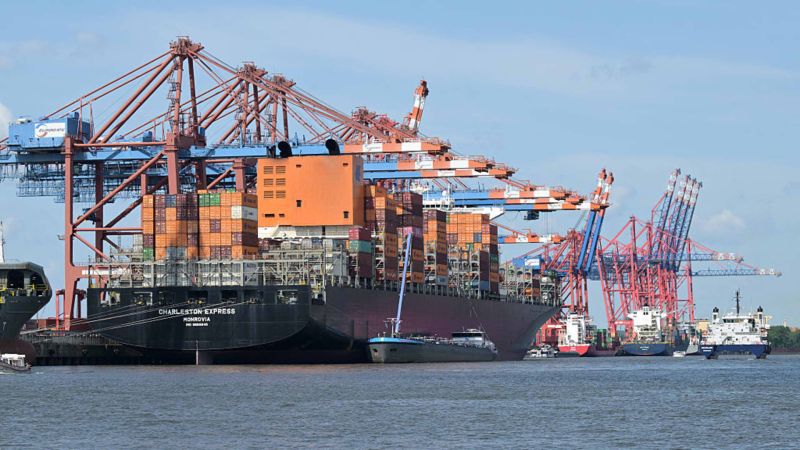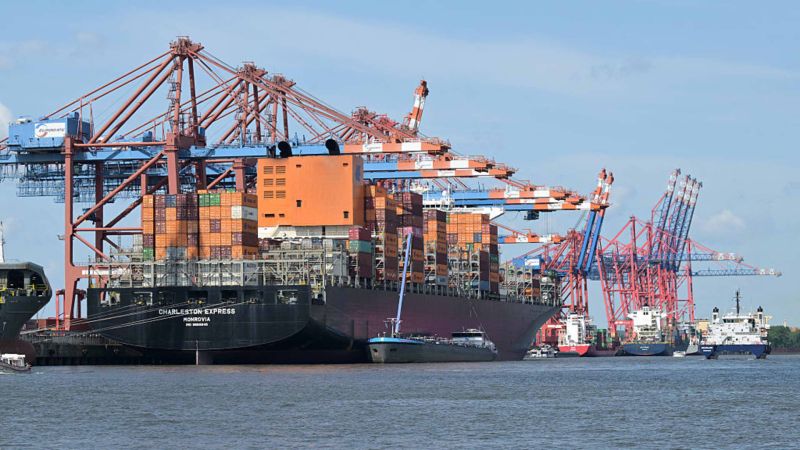## Level Up? Not Quite. World Bank Slams Brakes on Global Growth, and Your Wallet Might Feel It.
Gamers, strap in. The global economy’s taking a hit, and it could mean more than just a few skipped microtransactions. The World Bank just dropped a bombshell, slashing its growth predictions for the year, blaming a storm of trade turbulence. Think supply chain nightmares, inflation spikes, and a general sense of economic uncertainty that even the most hardcore RPG player won’t want to face.

Potential for Recovery: The Role of Trade Agreements
Easing Trade Tensions: A Path to Growth

The World Bank’s bleak outlook on global growth underscores the significant impact of trade uncertainty. However, there’s a glimmer of hope. The report highlights that a resolution of current trade disputes through lasting agreements could inject much-needed momentum into the global economy. If major economies were to strike deals that halved tariffs compared to their levels in late May 2025, global growth could be boosted by an average of 0.2 percentage points over 2025 and 2026.
This suggests that negotiated outcomes, leading to greater economic predictability, are crucial for fostering a positive environment for growth. For the gaming industry, this means that a reduction in trade barriers could lead to:
- Smoother cross-border development and distribution of games.
- Lower costs for game production and components, potentially leading to more affordable titles for consumers.
- Increased access to global talent pools, fostering innovation and diversity within the industry.

The Importance of Trade Deals for Gamers
Gamers, too, stand to benefit from reduced trade tensions. A stable global economic environment often translates to more consistent game releases, wider availability of titles, and potentially lower prices. The easing of regulations surrounding digital content distribution could also lead to more flexible and accessible gaming experiences across borders.
Gaming in a Recessionary Environment
Consumer Spending: How Economic Uncertainty Impacts Gaming Habits
Recessions often lead to a decrease in discretionary spending, and gaming, while a growing industry, can be vulnerable to such shifts. Consumers might prioritize essential expenses over entertainment, leading to a drop in game sales, subscription services, and in-game purchases.
Gamestanza analysis of past economic downturns suggests that certain gaming segments might be more resilient than others. Mobile gaming, with its free-to-play models and accessibility, often sees increased engagement during economic uncertainty. Free-to-play games with in-app purchases could experience a boost as players seek affordable entertainment options.
Industry Adaptation: Strategies for Developers and Publishers
To navigate a recessionary environment, developers and publishers need to adapt their strategies. Here are some key considerations:
- Focus on Value: Offer compelling content and experiences that justify spending, even with tighter budgets.
- Diversify Revenue Streams: Explore multiple monetization models, such as free-to-play, subscription services, and in-game purchases, to ensure revenue stability.
- Community Engagement: Foster a strong community around games through regular updates, events, and interactive content. Loyalty can help weather economic storms.
- Strategic Partnerships: Collaborate with other companies to reach new audiences and leverage existing user bases.
- Embrace Affordability: Develop games that are budget-friendly or offer free-to-play options to appeal to cost-conscious consumers.
- Focus on Narrative and Replayability: Games with strong stories and replayability can offer long-lasting entertainment value, justifying a higher price point.
- Explore Niche Markets: Target specific demographics or gaming interests with tailored content that caters to their unique needs and preferences.
The Silver Lining: Potential Opportunities in a Challenging Market
While recessions pose challenges, they can also create opportunities. Gamestanza has observed that innovative games that offer unique experiences and strong value propositions often thrive even during economic downturns.
Here’s how the industry could capitalize on the situation:
Navigating the Storm: Practical Advice for Gamers and Businesses
Managing Finances: Budgeting and Prioritizing Spending
In a recessionary environment, managing finances wisely becomes crucial. For gamers, this means:
- Set a Gaming Budget: Allocate a specific amount of money for gaming expenses and stick to it.
- Prioritize Purchases: Consider buying games on sale or exploring free-to-play options to stretch your budget further.
- Explore Subscription Alternatives: Evaluate the value of gaming subscriptions and consider alternatives if necessary.
- Control Costs: Identify areas where expenses can be reduced without compromising quality or innovation.
- Diversify Revenue Streams: Explore additional income sources to mitigate reliance on a single revenue stream.
- Manage Cash Flow: Track income and expenses carefully to ensure sufficient cash on hand to meet obligations.
- Real Estate: Rental properties can provide a steady stream of income, even during economic downturns.
- Precious Metals: Gold and silver are often seen as safe-haven assets that can retain value during times of uncertainty.
- Cryptocurrency: While volatile, certain cryptocurrencies have shown resilience in the past, potentially offering diversification benefits.
- Monitor Economic Indicators: Track key economic indicators such as GDP growth, inflation, and unemployment rates to gauge the overall health of the economy.
- Follow Industry News: Stay updated on gaming news, trends, and market analysis to understand the evolving dynamics of the industry.
- Engage with Communities: Connect with other gamers and industry professionals online and offline to share knowledge, insights, and perspectives.
For businesses, prudent financial management is essential for survival. Key strategies include:
Investing Wisely: Exploring Alternative Asset Classes
While traditional investments may face volatility during a recession, alternative asset classes can offer potential diversification and growth opportunities. Gamestanza recommends exploring options such as:
It’s crucial to conduct thorough research and consult with financial advisors before making any investment decisions.
Staying Informed: Tracking Economic Developments and Industry Trends
Staying abreast of economic developments and industry trends is vital for both gamers and businesses. Gamestanza provides valuable insights and analysis to help you navigate the evolving landscape:
Conclusion
The Economic Outlook Shifts: A New Reality Amidst Global Trade Turbulence
In a recent report, the World Bank has sounded the alarm, significantly slashing its global growth outlook due to escalating trade tensions and uncertainties. This development marks a stark departure from the initially optimistic projections, signaling a more tumultuous economic landscape for nations worldwide. The World Bank’s downward revision underscores the far-reaching consequences of protectionism, highlighting the need for collaborative efforts to mitigate the impact of trade turbulence on global growth.
The implications of this trend are far-reaching and complex, with potential ripple effects on employment rates, investment, and economic stability. As trade wars escalate and trade policies become increasingly restrictive, the outlook for businesses, particularly those in the gaming and entertainment sectors, appears increasingly uncertain. The World Bank’s warning serves as a reminder of the interconnectedness of the global economy and the need for nations to work together to foster an environment conducive to growth and innovation.
As the world grapples with the consequences of trade turbulence, it is imperative for policymakers, businesses, and individuals to adapt to this new reality. The future of global growth hangs in the balance, and the choices made in the coming months will have lasting impacts on economies, industries, and communities worldwide. As we navigate this uncertain landscape, one thing is clear: the world needs collaborative leadership, innovative solutions, and a willingness to adapt – or risk being left behind in the face of an increasingly turbulent economic future.